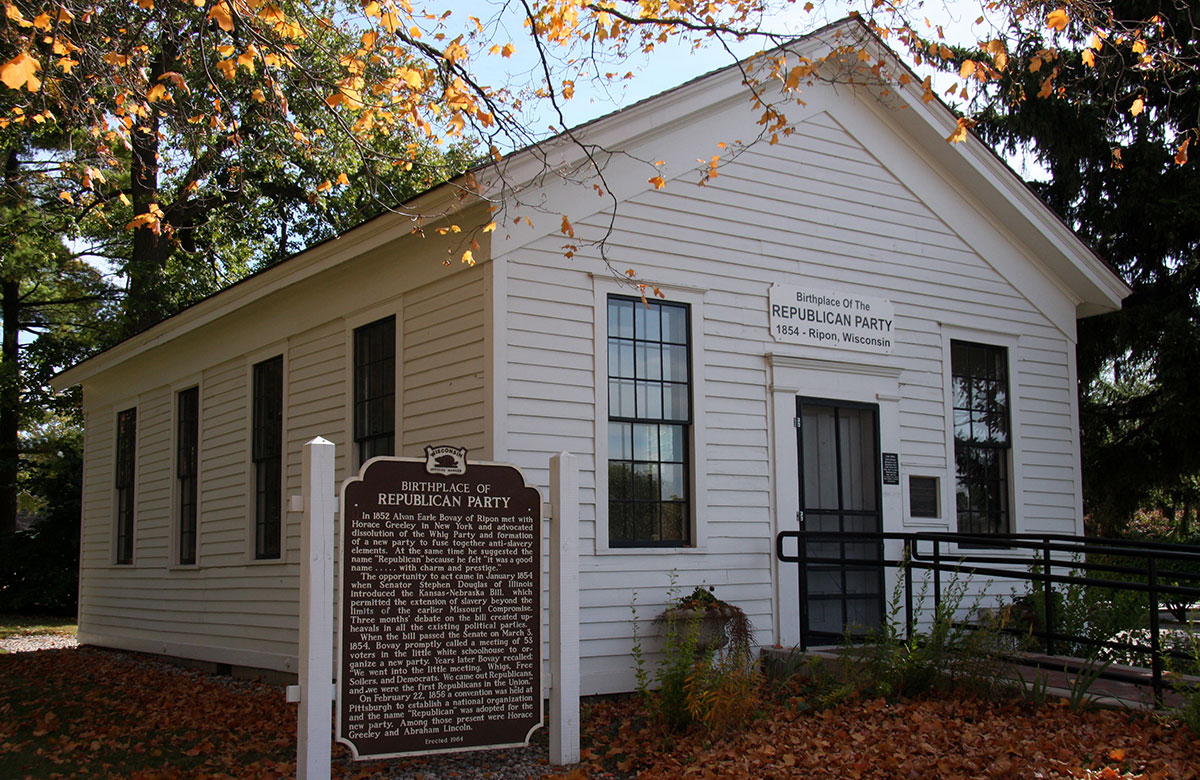Good Idea?
Acquittal for Animal Rights Activists

In March, a federal jury acquitted two animal rights activists charged with misdemeanor theft after they rescued two chickens from a Foster Farms slaughterhouse in central California.
Although Foster Farms valued the chickens – both of which were ill – at only $16, the defendants faced up to six months in jail. But they turned down several offers of a plea deal.
The defendants argued that because the birds were sick, they were unfit for food and therefore worthless.
The jury’s verdict “is a statement in defense of not just these two women’s right to rescue animals, but the right of every living being to be protected from corporate abuse,” said defense attorney Wayne Hsiung.
Source: Vox
Quotable
“We want to keep the Little White Schoolhouse as unaltered as possible.” – Mandy Kimes

The building in which the Republican Party was born in Ripon, Wis., has a new address.
City officials moved the building, known as the Little White Schoolhouse, to a new spot in the city. Ripon is located 87 miles northwest of Milwaukee.
Mandy Kimes, executive director of the Ripon Chamber of Commerce, said the move was designed to boost the building’s visibility to visitors to the 2024 Republican National Convention, which is scheduled to be held in Milwaukee.
The Republican Party grew out of a meeting in the Little White Schoolhouse that took place in the spring of 1854. Alvan Earle Bovary, a Ripon lawyer, called the meeting. At the meeting, local members of the anti-slavery Free Soil and Whig parties dissolved themselves and united to form the Republican Party.
Source: AP
Got a Nugget to Share?
Send your ideas for interesting facts, trends, tips, or other bits and bytes to wislawmag@wisbar.org, or comment below.
Did You Know?
FastCase and vLex Merger
Fastcase and vLex announced in April that they will merge. The new company will be called vLex Group and will reportedly have the largest number of lawyer and law firm subscribers in the world, as well as a library of more than 1 million documents.
vLex provides subscribers with access to legal documents from Europe, Africa, Asia, the Caribbean, and the Americas. The service is available in Spanish and English.
Fastcase has built its subscriber list (reported to contain more than 1 million lawyers) by forging partnerships with state and local bar associations, including the State Bar of Wisconsin.
Source: LexBlog
Out There
Up in Smoke?
Toys R Us has filed a trademark infringement lawsuit against Zaza R Us, an unlicensed cannabis retailer in Brooklyn, New York.
Zaza is a slang term for powerful strains of marijuana. The retailer’s sign looks similar to the iconic sign used by Toys R Us, including the blue or purple reverse R with a white star in the center.
In its complaint, which was filed in U.S. District Court for the Eastern District of New York, Toys R Us claims that the Zaza R Us sign constitutes a bad faith attempt to capitalize on the fame and goodwill of Toys R Us. The complaint seeks damages, disgorgement of profits, and a permanent injunction.
The first Toys R Us store opened in 1957 in Rockville, Maryland.
Source: LexBlog, The Washington Post
On the Radar
Copyright Guidance for AI-Generated Works
The U.S. Copyright Office in March partially revoked the copyright it had granted to Kristina Kashtanova for her graphic novel Zarya of the Dawn.
The cancellation came after the Copyright Office learned that Kashtanova had used Mid-journey, an artificial intelligence (AI) program, to create some of the images in the novel.
Shortly after cancelling Kashtanova’s copyright, the Copyright Office issued guidance regarding when it would grant copyright to works partially created by AI.
Under the guidance, if a human controls how AI technology interprets prompts and generates material, or modifies AI-generated material to the degree that the modifications qualify for a copyright, or selects and arranges material generated by AI in a sufficiently creative way, that portion of the work created by the human will be copyrightable.
Source: LexBlog
» Cite this article: 96 Wis. Law. 6 (June 2023).
